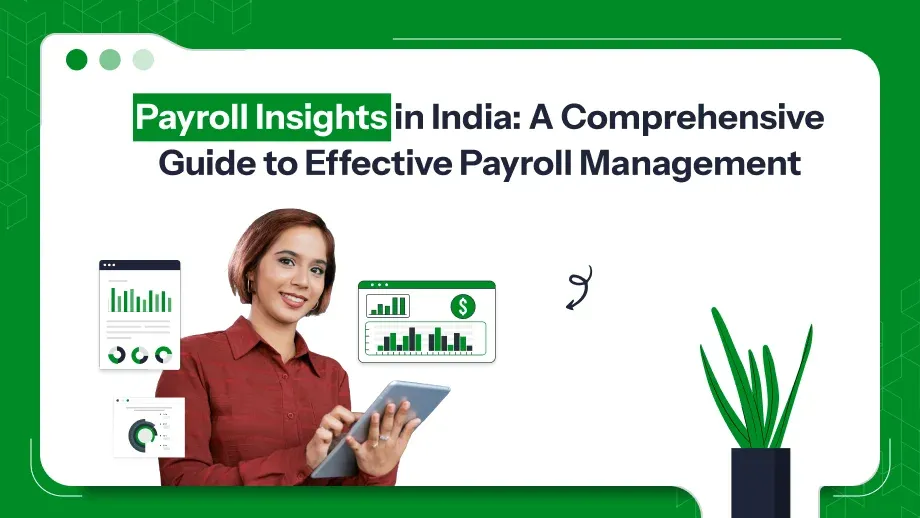
The foundation of any firm is payroll.The success of an organization depends on its leadership. Payroll insights in India involves more than just paying employees, it also involves navigating the country’s complicated tax code, following employment laws, and figuring out deductions in compliance with government guidelines. Prompt payments, adherence to rules, and contented workers are all components of good payroll management.
payroll insights Overview
In India, payroll insights is the process of paying workers for their labor, which includes determining wages, bonuses, and deductions while adhering to legal and tax regulations. Payroll management is difficult in India, however, due to the nation’s complex legal surroundings, which consists of many regulations, payroll tax regulations, and specific to the state regulations.
Main Elements of Payroll in India
Wage Structure for Indian Employee: Generally, for Indian employees, wage packages would have a multiplicity of components as described above. Basic Salary is core from which all others would flow.
House Rent Allowance : It may help employees meet or completely avoid paying rent at workplaces as per certain rules the tax man does not interfere either.
Special Allowance: The wage which an employer wishes to offer.
Bonuses and Incentives: Variable pay that may be linked to performance or productivity.
Deductions: There are various deductions applicable under Indian law.
Tax Deducted at Source (TDS): Employers are required to withhold income tax from workers’ paychecks and send it to the government.
Employee Provident Fund (EPF): Employer and employee contributions must be made to contribute to the Employee Provident Fund (EPF), a savings plan for retirement.
ESIDC: Social security systems that provide healthcare to employees whose income do not exceed a particular limit are referred to as ESIDCs.
Benefits to Employees: Employee benefits includes maternity leave, gratuities, and other government-provided retirement savings which must be processed via payroll.
Compliance: The regulation always mandates the company to adhere to the Payment of Wages Act, Employee Provident Fund Act, Income Tax Act, and more.
Companies must take an organized approach to handling payroll in India due to the country’s diverse workforce and complex tax rules. To guarantee a seamless and effective payroll process, Indian firms need to take into consideration these significant payroll insights.
Payroll Automation: Pay Management’s Future
The automation of the payroll procedure or payroll login has been one of the most significant advancements in the administration of payroll. Payroll processing or payroll insights login helps to avoid mistakes, especially in a nation like India whose tax laws and regulations continue to evolve.
Benefits of Automating Payroll
Accuracy: Payroll automation maintains every worker’s payments are accurate by removing human mistake from tax, deductive thinking, and bonus formulas.
Cost Time: Automation saves valuable time. It carries out payroll activities from data collection to attendance tracking it generates payslips and submits taxes, among others.
Compliance: Automated payroll systems are updated periodically to adhere to the latest tax laws, labor regulations, and social security contributions. This makes sure that businesses are operating in accordance with Indian regulation.
Automation can help businesses focus on strategic functions rather than spending time on repetitive tasks. It is also scalable, meaning it can handle payroll insights for a small team or a large workforce, depending on the organization’s growth.
Taxation in India: Understanding Tax Deductions and TDS in India
In the nation of India, TDS is essential to payroll management. The income tax act requires businesses to take taxes out of employees’ paychecks and send it to the state. Payroll conformity depends on the correct removal of Hst.
Main Considerations in TDS: Income Tax Slabs:India has income tax slabs as part of their progressive tax system. The rate of taxation must be applied by the company based on the workers’ earnings.
Deductions and Exemptions: A portion of taxable earnings can be reduced by using exemption such as the House Rent Allowance (HRA) and standard deductions. The company has responsibility to make certain that workers takes advantage of all the deductions allowed by sections 80C (putting money in PPF, LIC fees, etc.) and 80A (health care).
Form 16: Individuals have to get Form 16 from their companies at the end of the fiscal year. The entire salary paid and the tax deducted are shown on this piece of writing. It can be employed by employees for submitting their tax returns for income.
In view of the Indian taxation system, employers ought to stay clear of any potential delays or errors in TDS deduction. They will be penalized or subject to legal action as a result. To make process easier, most companies incorporate TDS reporting and computations within the payroll software.
Compliances with Labor Laws: Payroll Compliance in India
Firms must abide by India’s broad and intricate labor legislation to guarantee appropriate payroll administration. The laws governing the payment of Wages Act, EPF Act, ESI Act, and the Gratuity Act are the major employment laws in the country which have an impact on payroll.
Key Payroll Compliance Considerations:
Employee Provident Fund (EPF): A portion of the initial salary goes to the EPF by the company and the employee. The worker receives his EPF amount back at retiring after it accumulates over the years.
Employees’ State Insurance (ESI): Worker medical coverage is offered by Eap in the event of illness, injury, or maternity leave. Employers have to guarantee that the required ESI contribution in payroll deductions is deducted from qualified employees’ salaries and gave to the government.
Gratuity: Employees have the right to a bonus following five years of continuous employment. The bonus is calculated by the worker’s latest salary and years of performance.
Maternity Benefit: Under the Maternity Benefit Act, female employees are entitled to up to 26 weeks of paid time off for pregnancy, that needs to be managed via payroll.
Complete conformity to these regulations regarding labor is essential because noncompliance may result in serious consequences and damage to reputation. The latest changes to labor laws can be encompassed into Indian payroll insights.
Outsourcing Payroll: An Crucial Step for Indian Companies
For correct and timely payroll processing, nearly all of SMEs in India contract with outside service providers. Outsourced payroll helps companies to concentrate on what they do best while entrusting complicated payroll duties to experts.
Benefits of Outsourcing Payroll:
Efficiency and Expertise: Payroll outsourcing firms are knowledgeable about Indian labor regulations, taxes, and compliance. This implies that the company will continue to abide by governmental regulations.
Cost-effective: outsourcing payroll operations is cheaper than hiring a staff internally. Particularly for SMEs who are unable to pay for payroll specialists, this may prove extremely affordable.
Reduced Risk: Outsourcing payroll reduces the possibility of errors, missed deadlines, and compliance issues because outside vendors have robust procedures and processes in existence.
Payroll outsourcing or payroll insights could represent a smart strategy option for businesses that want to zero in on innovation and expansion while maintaining accuracy, conformity, and effectiveness in handling payroll.
Data Security and Privacy in Payroll Management
Businesses are growing more worried about data security as payroll systems become more digital. Employee financial accounts, tax returns, and personal identifiers constitute some of the confidential information found in payroll which has to be protected from online threats and illegal access.
Top Techniques for Encrypting Payroll Data Security: To prevent unwanted access, make sure all payroll information is protected by encryption both in transit as well as at rest.
Access Control: To limit who can view or alter payroll information, stringent access controls should be implemented. Highly important data should only be accessible by authorized individuals.
Frequent Audits: To identify and address any potential weaknesses, payroll systems or payroll insights ought to undergo routine audits.
Companies should follow data security best practices and purchase secure payroll software to guarantee that employee data is safe from cybersattacks
Employee Engagement and Payroll Transparency
Payroll insights directly affects the engagement and satisfaction of employees. It is possible for employees to feel valued and motivated when they are paid accurately and on time, with the proper communication of their deductions and benefits.
How Payroll Impacts Employee Engagement
Payment: Failure to pay an employee on time can result in frustration and dissatisfaction. A company must ensure that employees receive their money on time each month.
Clear Payslips: Employees payroll payslips may see how their pay is determined and what deductions have been made on clear, comprehensive paystubs.
Flexible Payment Options: Giving employees the option of upon request, mobile, or direct deposit payments can improve their overall satisfaction with the payroll application.
Transparency in pay: It builds confidence among both employers and staff members, which contributes to a positive business environment.
Conclusion
India’s payroll sector and payroll insights is changing quickly because of automation, digitization, and modifications to labor and tax regulations. Businesses can improve employee happiness, lower risks, and streamline payroll procedures by implementing payroll automation, adhering to the nation’s various laws and regulations, and focusing on security of data.
If Indian businesses want to thrive and remain viable, they must keep up with evolving labor laws, tax rules, and payroll advances in technology. Employing advanced payroll management systems or outsourced payroll, businesses must prioritize efficiency, compliance, and transparency in order to promote smooth operations and an enjoyable work environment.







